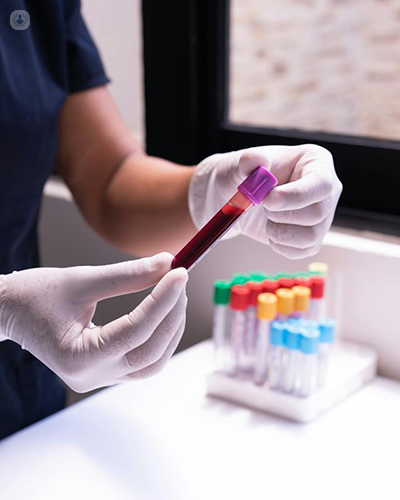Safeguarding your health: The crucial role of regular blood testing
Written in association with:Regular blood tests do more than just diagnose health problems. They can also ensure early detection of various conditions, help your doctor to provide more personalised care, and allow patients to be proactively engaged in maintaining good health by better understanding their overall wellbeing. To learn more about the importance of regular blood testing in maintaining good health and wellbeing, we invited highly respected GP Dr Anshumen Bhagat to share his expert insight.

What are blood tests?
Blood tests, also sometimes called blood screening or blood work, involve the analysis of a small sample of your blood to assess various aspects of your health. Blood testing can provide valuable insights into your overall health, including indicators related to your red and white blood cells, platelets, cholesterol levels, and organ function.
How can blood testing help with the early detection of some health conditions?
Regular blood tests can pick up on health issues before they manifest into serious concerns. For instance, indicators of conditions like diabetes, high cholesterol, anaemia, or even certain infections could be revealed in blood testing. Detecting these issues at an early stage allows for timely intervention and management and prevents them from progressing into more serious or chronic health problems.
What information can blood testing give about a person?
Each person’s health is unique and blood tests offer a personalised assessment of a number of key factors which can impact your wellbeing. Blood testing informs your healthcare practitioner and allows them to tailor their advice and treatment plans based on your specific health profile. Whether it's understanding the impact of diet and lifestyle on your health or assessing the effectiveness of your medication, regular blood tests help in providing a more customised and effective healthcare approach.
How can regular blood testing help to maintain good health over time?
By comparing results from successive blood tests, trends and changes can be identified, prompting your doctor to take the necessary preventive actions. This helps to pick up any abnormalities or risks early on, allowing for timely interventions to maintain optimal health, rather than ‘catch-up’ treatment to resolve troublesome symptoms or conditions.
How else do patients benefit from regular blood testing?
Empowerment through knowledge is a significant benefit of regular blood tests. Understanding your blood test results and the insights they provide about your health allows you to actively engage in maintaining your own wellbeing. This insight can also help you to make informed decisions about your lifestyle, diet, and medical care, as well as contributing significantly to your overall wellbeing.
To schedule a blood test and gain better insight into your overall health and wellbeing, visit Dr Bhagat’s Top Doctors profile today.


